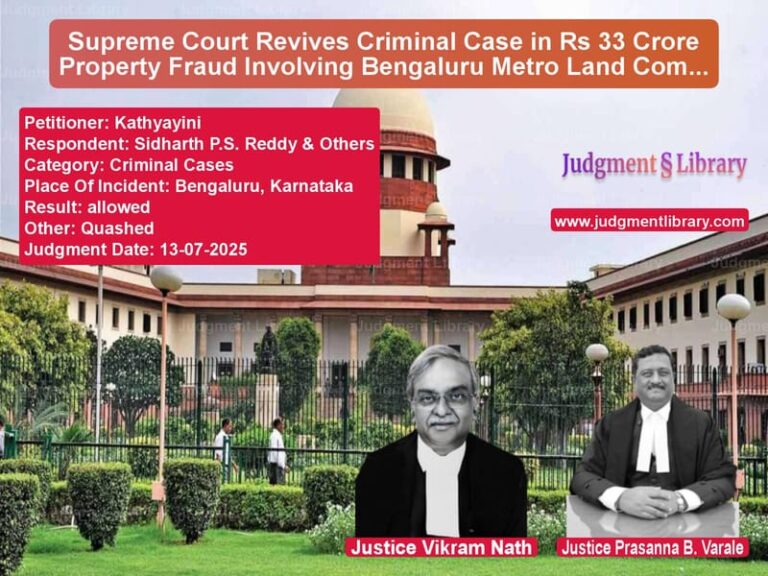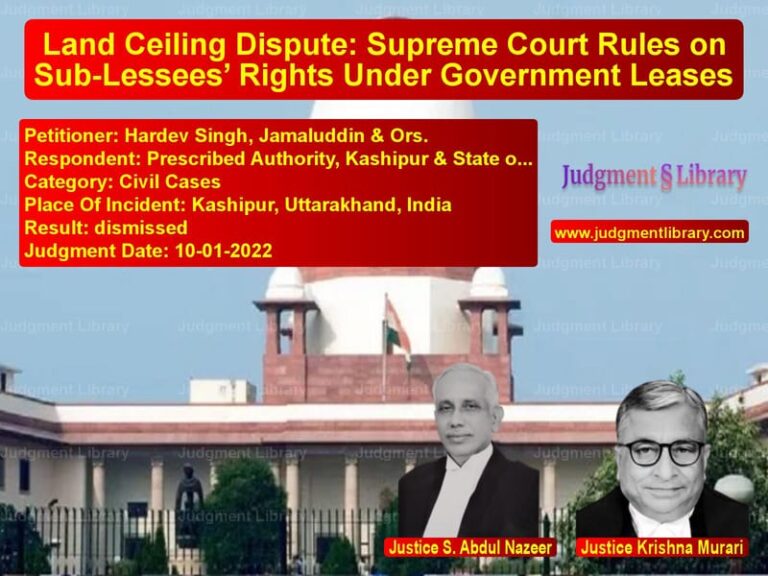Loan Default and Mortgage Dispute: Supreme Court Upholds Canara Bank’s Recovery Rights
The case of Canara Bank v. P. Selathal & Ors. deals with a long-standing legal battle regarding loan default, mortgage disputes, and the jurisdiction of civil courts in financial recovery matters. The Supreme Court examined whether civil courts had the authority to entertain suits challenging a Debt Recovery Tribunal (DRT) decree and whether the plaintiffs’ claims of fraud justified bypassing the DRT’s established procedures. This judgment reinforces the principle that financial recovery matters must be handled through designated legal mechanisms under the Recovery of Debts Due to Banks and Financial Institutions Act, 1993 (RDDBFI Act).
Background of the Case
The dispute arose when Canara Bank sanctioned a loan of Rs.49,50,000 to M/s. Coimbatore Hatcheries, a partnership firm with Shri Ravichandran and G. Suresh Babu as partners. To secure the loan, the firm mortgaged immovable property belonging to them and their guarantor, Shri M.C. Kallikutty. The loan agreement included an equitable mortgage executed through a deposit of title deeds.
When the firm defaulted, Canara Bank initiated recovery proceedings in 1997 before the Debt Recovery Tribunal (DRT), Chennai, against the borrower, the partners, and the guarantor. The DRT passed an ex-parte decree in 2003, ordering the firm and its guarantor to pay Rs.57,35,770 with 18% interest per annum. A recovery certificate was issued in favor of Canara Bank, leading to auction proceedings.
However, after several years, the original guarantor, M.C. Kallikutty, along with the plaintiffs (alleged purchasers of the mortgaged land), filed civil suits in 2010 and 2011, challenging the validity of the DRT decree and seeking a declaration that the mortgage was fraudulent and void. Canara Bank moved to have these suits dismissed under Order 7 Rule 11 of the Civil Procedure Code (CPC), citing the RDDBFI Act’s exclusive jurisdiction over financial recovery disputes. The High Court of Madras rejected the bank’s application, prompting this appeal to the Supreme Court.
Legal Issues Involved
- Whether civil courts have jurisdiction to entertain suits challenging a DRT decree.
- Whether allegations of fraud justify bypassing the specialized recovery mechanism under the RDDBFI Act.
- Whether the plaintiffs, as third-party purchasers, had the legal standing to challenge the DRT decree.
- Whether the High Court erred in refusing to dismiss the civil suits under Order 7 Rule 11 of the CPC.
Petitioner’s Arguments
Canara Bank, represented by its legal counsel, contended:
- The DRT had already adjudicated the loan default and mortgage validity, issuing a final decree in 2003, which was binding.
- The RDDBFI Act provides an exclusive mechanism for debt recovery, barring civil courts from entertaining related disputes.
- The plaintiffs were attempting to bypass the DRT’s jurisdiction by alleging fraud without substantial evidence.
- The High Court and trial court failed to apply Order 7 Rule 11 of the CPC correctly, allowing frivolous litigation to continue.
Respondent’s Arguments
The plaintiffs, who claimed to have purchased the disputed land, argued:
- The mortgage was fraudulently created, as the original owner, M.C. Kallikutty, never consented to the transaction.
- The DRT’s decree was obtained through misrepresentation, and only a civil court could examine the validity of the mortgage.
- Since they were third-party purchasers, they were not bound by the DRT’s order and had the right to challenge the mortgage in a civil court.
- The High Court correctly refused to reject their suits, allowing them the opportunity to prove fraud.
Supreme Court’s Analysis
The Supreme Court examined the provisions of the RDDBFI Act, the CPC, and the legal principles governing jurisdiction and fraud claims. Key observations included:
- The RDDBFI Act provides a comprehensive framework for banks and financial institutions to recover debts, restricting civil courts from interfering in such matters.
- Fraud allegations must be specific and substantiated; vague claims cannot justify circumventing specialized legal forums.
- The plaintiffs’ claim that they only recently discovered the mortgage was untenable, given the long gap between the mortgage creation (1995) and their suits (2010-2011).
- The DRT’s decree had already attained finality, and any challenge should have been made through an appeal under Section 20 of the RDDBFI Act.
Final Judgment
The Supreme Court ruled in favor of Canara Bank, holding that:
- The civil suits challenging the DRT decree were not maintainable under Sections 18 and 20 of the RDDBFI Act.
- The plaintiffs’ fraud allegations were unsubstantiated and insufficient to override the DRT’s jurisdiction.
- The High Court erred in refusing to dismiss the suits under Order 7 Rule 11 of the CPC.
- The suits filed by the plaintiffs were frivolous and an abuse of the judicial process.
- The trial court’s orders and the High Court’s judgment were set aside, and the civil suits were dismissed.
Impact of the Judgment
This ruling has significant implications for banking and financial litigation:
- It reaffirms the RDDBFI Act’s exclusive jurisdiction in debt recovery matters, limiting civil courts’ interference.
- It underscores the need for substantive proof in fraud claims to avoid misuse of the legal system.
- It prevents defaulting borrowers and third-party purchasers from delaying debt recovery through frivolous litigation.
- It strengthens the legal framework for financial institutions to enforce their security interests effectively.
By upholding Canara Bank’s recovery rights and dismissing meritless suits, the Supreme Court ensured that financial institutions are protected from undue litigation, thereby promoting a more robust debt recovery system.
Petitioner Name: Canara Bank.Respondent Name: P. Selathal & Ors..Judgment By: Justice Uday Umesh Lalit, Justice Indira Banerjee, Justice M.R. Shah.Place Of Incident: Tamil Nadu.Judgment Date: 28-02-2020.
Don’t miss out on the full details! Download the complete judgment in PDF format below and gain valuable insights instantly!
Download Judgment: Canara Bank vs P. Selathal & Ors. Supreme Court of India Judgment Dated 28-02-2020.pdf
Direct Downlaod Judgment: Direct downlaod this Judgment
See all petitions in Debt Recovery
See all petitions in Banking Regulations
See all petitions in Judgment by Uday Umesh Lalit
See all petitions in Judgment by Indira Banerjee
See all petitions in Judgment by Mukeshkumar Rasikbhai Shah
See all petitions in allowed
See all petitions in Quashed
See all petitions in supreme court of India judgments February 2020
See all petitions in 2020 judgments
See all posts in Civil Cases Category
See all allowed petitions in Civil Cases Category
See all Dismissed petitions in Civil Cases Category
See all partially allowed petitions in Civil Cases Category







